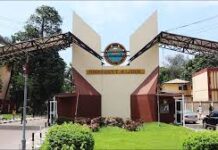African university heads, research bodies and senior role-players in higher education have agreed on a charter that outlines key principles for fostering transformative research collaborations across the continent.
The Africa Charter for Transformative Research Collaborations was one of the key outcomes of the biennial Conference of Rectors, Vice-Chancellors and Presidents of African Universities (COREVIP) in Windhoek, Namibia, under the theme: ‘Advancing Excellence in African Higher Education’.
Organised by the Association of African Universities (AAU) in collaboration with the University of Namibia, the conference, which ended on 7 July, was attended by 400 higher education role-players from across the continent.
While discussions ranged across critical challenges facing the sector, one of the main highlights was the charter which proposed collaboration that would serve a more just and richer, pluriversal global scientific effort across the natural and social sciences, arts and humanities, in which Africa takes its rightful place.
This charter aligns with the core values of the 2022 UNESCO framework on open science and builds on significant, ongoing efforts to promote equity in research partnerships.
These include best practice recommendations based on comprehensive consultations with stakeholders and funders internationally, including the Knowledge Equity Network, and practical instruments such as the Equitable Research Partnerships Toolkit.
Above all, this charter draws on and is imbued with, a long history of pan-African intellectual thought and engagement concerned with upholding and advancing the continent’s contribution to the generation of scientific knowledge.
What does the charter focus on?
The charter is an initiative by the Perivoli Africa Research Centre, or PARC, University of Bristol, in partnership with the University of South Africa’s, Chief Albert Luthuli Research Chair and the University of Cape Town’s Institute for Humanities in Africa, or HUMA.
The initiative is also a joint endeavour of Africa’s foremost higher education bodies and networks, including the AAU, the African Research Universities Alliance, or ARUA, the Inter-University Council of East Africa, or IUCEA, the Association of West African Universities, the Council for the Development of Social Science Research in Africa, or CODESRIA, the African Academy of Sciences and the International Network for Higher Education in Africa.
In summary, the charter is dedicated to:
• Upholding and advancing Africa’s contribution to the world’s generation of scientific knowledge;
• Expanding Africa-Global North research collaboration;
• Ensuring an increase in ‘Equitable Africa-Global North’ research partnership efforts;
• Emphasising the need for a fundamental rebalancing of the global science and research ecosystem;
• Exploring the potential of transformative research collaborations;
• Levelling the uneven playing field in the Africa-Global production of scientific knowledge: multi-layered power imbalances; and
• Establishing transformative collaborations as best and standard practice.
Along with providing principles for transformative research collaboration, the document states that efforts to effect structural change must be anchored in an African-centred framework that defines and garners endorsement by key actors involved in research collaborations; recommends, identifies goals and measures of success, and provides guidance for concrete action by building on relevant best practices.
The Secretary-General of the AAU, Professor Olusola Oyewole, said the charter establishes the foundation for such [an African-centred] framework.
It does so by defining fundamental principles for transformative research collaboration and sets out broad aspirations for changes in policy and regulatory frameworks by higher education institutions and networks, funders, research and assessment bodies, publishers, governments and international science policy bodies – to establish such a collaboration mode as best and standard practice.
Concerning international science, Oyewole said there was a need to adapt existing or establish new international policies to advance research collaboration.
Regarding science publishing, there was a proposal to align publishing policies and guidelines to favour manuscripts reporting on collaborative inquiry.
Remaining challenges
While the emphasis was on the charter as the vital outcome of the conference, some of the critical sub-themes which guided discussions at the meeting were on doctoral education; partnerships or cooperation and internationalisation; institutional differentiation; university-industry linkages; the role of the intellectual diaspora; as well as funding and financing.
Professor Bakri Osman Saeed, the president of the governing board of the AAU, said the 22nd COREVIP provided a platform to foster engaging discussions, spotlight successful initiatives and generate critical recommendations toward ensuring sustainable progress in Africa’s higher education sector.
Minister of Higher Education, Innovation and Technology of the Republic of Namibia Dr Itah-Kandjii Murangi highlighted the role of higher education systems as seats of knowledge creation, skills development, and invention generation through research and innovations.
She said that, since independence in 1990, Namibia had prioritised investment in higher education.
She noted that, despite this investment, equitable access remains a challenge, as funding to meet the demand for quality and equitable higher education still requires attention to effectively respond to the need to produce the requisite workforce in this digital era.
Murangi added that the conference had come “at an opportune time to foster the sharing of international experiences, forge links and collaboration as we interrogate the challenges confronting the African higher education system”.
Addressing participants in a presentation titled ‘Why Advancing Excellence in Higher Education Is Important’, Professor Kenneth Matengu, the vice-chancellor of the University of Namibia, examined Africa’s position, vis-à-vis the rest of the world on critical issues including research production, literacy rate, enrolment, university ranking performance, higher education spending, access to electricity, and the number of African Nobel Prize laureates. Unfortunately, Africa’s scores, percentages, and numbers remain weak and were lower than the global average in most instances.
Highlighting the vast youth population of Africa, Matengu called on delegates to put in place drastic and strategic measures to change the narrative and help the youth prepare for the future.
Matengu also appealed to African governments and other key stakeholders to commit to financing research and development, student and staff mobility and for the intellectual diaspora to play its part in higher education as well.
University World News














